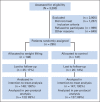Weight Lifting and Physical Function Among Survivors of Breast Cancer: A Post Hoc Analysis of a Randomized Controlled Trial
- PMID: 25964257
- PMCID: PMC4477788
- DOI: 10.1200/JCO.2014.57.7395
Weight Lifting and Physical Function Among Survivors of Breast Cancer: A Post Hoc Analysis of a Randomized Controlled Trial
Abstract
Purpose: Survivors of breast cancer may experience deterioration of physical function. This is important because poor physical function may be associated with premature mortality, injurious falls, bone fracture, and disability. We conducted a post hoc analysis to explore the potential efficacy of slowly progressive weight lifting to reduce the incidence of physical function deterioration among survivors of breast cancer.
Methods: Between October 2005 and August 2008, we conducted a single-blind, 12-month, randomized controlled trial of twice-per-week slowly progressive weight lifting or standard care among 295 survivors of nonmetastatic breast cancer. In this post hoc analysis of data from the Physical Activity and Lymphedema Trial, we examined incident deterioration of physical function after 12 months, defined as a ≥ 10-point decrease in the physical function subscale of the Medical Outcomes Short-Form 36-item questionnaire.
Results: The proportion of participants who experienced incident physical function deterioration after 12 months was 16.3% (24/147) in the control group and 8.1% (12/148) in the weight lifting group (relative risk, 0.49; 95% CI, 0.25 to 0.96; P = .04). No serious or unexpected adverse events occurred that were related to weight lifting.
Conclusion: Slowly progressive weight lifting compared with standard care reduced the incidence of physical function deterioration among survivors of breast cancer. These data are hypothesis generating. Future studies should directly compare the efficacy of weight lifting with other modalities of exercise, such as brisk walking, to appropriately inform the development of a confirmatory study designed to preserve physical function among survivors of breast cancer.
Trial registration: ClinicalTrials.gov NCT00194363.
© 2015 by American Society of Clinical Oncology.
Conflict of interest statement
Authors' disclosures of potential conflicts of interest are found in the article online at
Figures
References
-
- DeSantis CE, Lin CC, Mariotto AB, et al. Cancer treatment and survivorship statistics, 2014. CA Cancer J Clin. 2014;64:252–271. - PubMed
-
- Taylor R, Davis P, Boyages J. Long-term survival of women with breast cancer in New South Wales. Eur J Cancer. 2003;39:215–222. - PubMed
-
- Katz S, Branch LG, Branson MH, et al. Active life expectancy. N Engl J Med. 1983;309:1218–1224. - PubMed
-
- Jette AM. Toward a common language for function, disability, and health. Phys Ther. 2006;86:726–734. - PubMed


